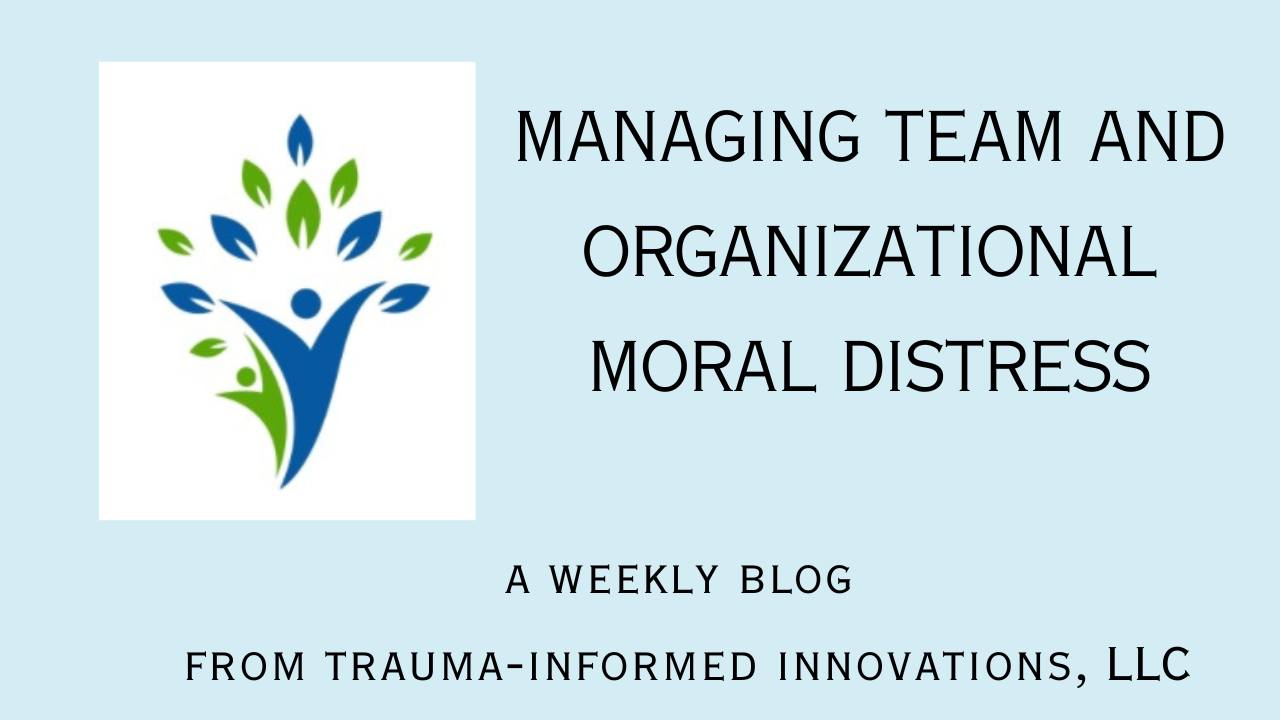Why We Need Trauma-Informed Leaders Right Now
Over the last month, we have watched the new administration here in the United States assume power like a bull in a China shop – creating chaos, issuing disturbing directives, and promoting cultures of divisiveness. This rhetoric shifts values from compassion to control, promotes bullying, limits transparency, and creates a profound LACK of safety for many of us.
Unfortunately, these power tactics can be compelling because they appear to be successful, at least initially. This wield of power can help some people feel safer – as though there is a big strong leader who will fight against the world to protect them. This works in the short term if that leader can characterize everyone ELSE as the enemy that we need to be protected from. While some might feel safer and more protected under this style of leadership, those of us who do not resemble the group in power feel threatened, alienated, frightened, and angry. I think that most of us would agree that if we worked at a company with this type of toxic culture, we would be looking at the ads for new job prospects online every day!
Research tells us that we all benefit from leadership that is compassionate, kind, transparent, holds people accountable, and creates inclusive spaces where everyone has an opportunity to share their unique perspectives and viewpoints. In truth, this idea of “masculine energy” culture characterized by violence and aggression is one of the most ineffective ways of creating the types of organizations that we all want – productive, innovative, and sustainable.
While I find the current rhetoric and messaging to be alarming and disturbing, I believe now, more than ever, we need trauma-informed leaders. In our rapidly evolving world, filled with uncertainties and ongoing challenges, the need for compassionate and understanding leadership has never been more important. From the lasting effects of the global pandemic to social justice movements and mental health awareness, trauma is something many individuals and communities are navigating daily – whether we consciously know about it or not. I fundamentally believe that a world built on trauma-informed principles is a better place for ALL of us. Trauma-informed leadership provides an essential framework for guiding teams, organizations, and communities with compassion, support, and understanding.
The great news is that many of you are committed and embody the characteristics of a trauma-informed leader – even if you don’t fully realize it. You have a growth mindset that is focused on constantly learning and striving to create resilient and supportive teams. Here are 7 signs that you are a trauma-informed leader:
1) You Understand the Prevalence and Impact of Trauma on Individuals and Your Teams
Trauma is far more widespread than we often realize. It’s not just about visible physical injuries or catastrophic events, it includes emotional, psychological, and environmental stressors. Trauma can stem from personal experiences like abuse, loss, or neglect, but it can also result from external factors like social inequality, discrimination, or systemic oppression.
In the workplace, the effects of trauma can be seen at both the employee level and at the broader organizational levels. At the individual employee level, we see increases in employee burnout, disengagement, absenteeism, and high turnover. At the organizational level, we see toxic cultures and organizations that may be momentarily successful but don’t sustain in the long run. Leaders who do not understand that individuals often carry their own unique traumas which impact how they engage in their work might inadvertently create environments that exacerbate these issues.
If you are a leader who acknowledges the range of experiences that your team members may have gone through and understands how these experiences affect behavior, performance, and relationships, you are better equipped to manage these challenging times through a trauma-informed lens.
2) You Are Consistently Enhancing Trust and Psychological Safety
If you value environments characterized by trust and psychological safety, you are already on your way to becoming a trauma-informed leader. Trauma-informed leaders create an environment where employees feel safe to express themselves without fear of judgment or retribution. By prioritizing trust and transparency, these leaders foster psychological safety, encouraging open communication and collaboration. Trauma-informed leaders prioritize respect, set clear expectations, and foster open lines of communication. When people feel safe, they are more likely to engage, contribute, and perform at their best.
3) You Actively Work to Increase Employee Retention and Engagement
When trauma is ignored, it can lead to disengagement and low retention. Team members who feel unheard or unsupported might emotionally withdraw, leading to dissatisfaction, reduced morale, and higher turnover. We know that high turnover in organizations is costly and decreases innovation and quality of the services provided. A trauma-informed leader helps create a culture where employees feel valued and supported. This reduces turnover rates as employees are more likely to stay with an organization that understands their needs, fosters growth, and offers a healthy, inclusive environment.
If you prioritize helping your team members feel understood and supported, you are a trauma-informed leader. Trauma-informed leadership nurtures an environment where employees are motivated, committed, and aligned with the organization’s goals, leading to higher levels of engagement, increased productivity, and lower turnover.
4) You Value and Commit to Ongoing and Transparent Communication
Trauma can manifest in many ways, including through communication barriers, heightened sensitivity, or avoidance of critical conversations that need to happen to be successful. As a trauma-informed leader, you know how to address these challenges with compassion and care.
Trauma-informed leaders know how to communicate with empathy and patience, understanding that trauma can affect how people express themselves. This leads to clearer, more compassionate communication and minimizes misunderstandings, resulting in stronger, more positive relationships.
We all know that poor communication can create a breeding ground for increased conflict. Trauma-informed leaders approach conflicts with an understanding that stress, trauma, or past experiences can influence reactions. Instead of reacting to conflict or stress, trauma-informed leaders approach issues with patience and understanding, helping to resolve tensions in a healthy and constructive manner. By fostering effective communication, leaders can build trust and reduce misunderstandings.
5) You Champion Inclusivity and Diversity
As organizations become more diverse, it’s critical that leadership practices evolve to accommodate different needs and perspectives. Trauma-informed leadership allows leaders to do so with sensitivity and awareness. Despite the current rhetoric focused on dismantling diversity, equity, and inclusion initiatives, we know that a more diverse and inclusive workforce is also a workforce that is more creative and innovative.
If you are maintaining an active commitment towards diversity, equity, and inclusion, you are already well on your way to becoming a trauma-informed leader. Trauma-informed leaders understand that everyone’s experiences are unique. These leaders don’t just tolerate diversity, they actively champion inclusivity. Whether it’s based on race, gender, socioeconomic status, or past experiences, if you strive to create spaces where all individuals feel equally respected and empowered, you have many of the characteristics of a trauma-informed leader.
6) You Work with Your Teams to Reduce Stress and Burnout
Trauma-informed leaders understand the relationship between being constantly activated and stressed out with poor performance. When we are consistently exposed to stressful interactions in toxic environments characterized by abuse and violence, we are always on guard, trying to protect ourselves from potential threats. Very quickly, this translates into being hyperreactive, stressed, and eventually burnt out. We can only survive in those cultures for so long before we decide that our health is more important. By acknowledging the impact of trauma and ongoing stress, trauma-informed leaders implement strategies that help employees manage stress, such as offering flexibility, promoting work-life balance, and providing emotional support. This can significantly reduce the risk of burnout and help employees maintain long-term well-being.
7) You Strive to Create a More Positive Team and Organizational Cultures
A trauma-informed approach builds strong, supportive relationships among team members. Leaders who understand trauma's impact foster collaboration, connection, and create a sense of belonging, which strengthens team cohesion and encourages mutual respect and cooperation. When we feel connected to those around us, we are more likely to be engaged and connected to our team.
At the broader organizational level, organizations led by trauma-informed leaders tend to cultivate a culture of empathy, respect, and inclusivity. This positive environment not only supports individual well-being but also contributes to a healthier overall workplace culture where employees feel connected to the organization's mission and values. If you are committed to creating a more positive team and promoting stronger organizational cultures, you are a trauma-informed leader.
Trauma-informed leadership is not just a set of practices—it’s a mindset that can transform the way an organization operates, positively impacting everyone from leadership to individual team members.
I hope as you are reviewing these practices, you see a lot of your style reflected in them. We need trauma-informed leaders now, more than ever.
If you’re interested in more support during these challenging times, would like to grow in any of these areas, or want to fine tune your skills, I’m excited to announce that I’m launching individual and group coaching focused on trauma-informed leadership. Stay tuned for more information to be released this week.



Responses